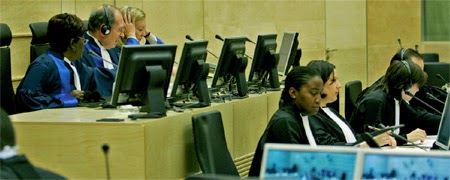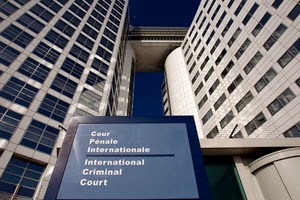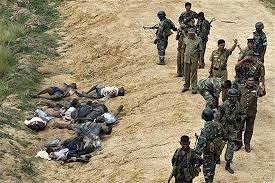
WAR CRIMES AND CRIMES AGAINST HUMANITY

or something that pops up when you talk about people like Charles Taylor and
Saddam Hussein. Don’t laugh anyway, because War Crimes are very serious
allegations as they usually have to do with killing and dishing out inhuman
treatment to others. Why do you think the world had to set up a court to try
war crimes, trust me, it’s a big deal.
17 July 1998, a conference of 160 States established the first treaty-based
permanent international criminal court. The treaty adopted during that
conference is known as the Rome Statute
of the International Criminal Court. Among other things, it sets
out the crimes falling within the jurisdiction of the ICC, the rules of procedure
and the mechanisms for States to cooperate with the ICC. The countries which
have accepted these rules are known as States Parties and are represented in
the Assembly of States Parties.
The Assembly of States Parties, which meets
at least once a year, sets the general policies for the administration of the
Court and reviews its activities. During those meetings, the States Parties
review the activities of the working groups established by the States and any
other issues relevant to the ICC, discuss new projects and adopt the ICC’s
annual budget.
Criminal Court (ICC) , war crimes include grave breaches of the Geneva
Conventions and other serious violations of the laws and customs applicable in
international armed conflict and in conflicts “not of an international
character” listed in the Rome Statute, when they are committed as part of
a plan or policy or on a large scale. These prohibited acts include:
- murder;
- mutilation,
cruel treatment and torture; - taking
of hostages; - intentionally
directing attacks against the civilian population; - intentionally
directing attacks against buildings dedicated to religion, education, art,
science or charitable purposes, historical monuments or hospitals; - pillaging;
- rape,
sexual slavery, forced pregnancy or any other form of sexual violence; - conscripting
or enlisting children under the age of 15 years into armed forces or
groups or using them to participate actively in hostilities.
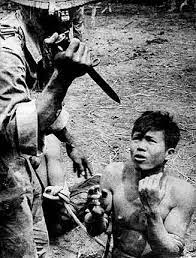
On the other hand, “Crimes against humanity”
include any of the following acts committed as part of a widespread or
systematic attack directed against any civilian population, with knowledge of
the attack:
- murder;
- extermination;
- enslavement;
- deportation
or forcible transfer of population; - imprisonment;
- torture;
- rape,
sexual slavery, enforced prostitution, forced pregnancy, enforced
sterilization, or any other form of sexual violence of comparable gravity; - persecution
against an identifiable group on political, racial, national, ethnic,
cultural, religious or gender grounds; - enforced
disappearance of persons; - the
crime of apartheid; - other
inhumane acts of a similar character intentionally causing great suffering
or serious bodily or mental injury.
Sad massacre, where 4,211 civilians (2,842 Serbs, 1,250 Jews, 64 Roma, 31
Rusyns, 13 Russians and 11 ethnic Hungarians) rounded up and killed by
Hungarian troops in reprisal for resistance activities. The Mahmudiyah killings during the Iraq war involving
the rape and murder of a 14-year-old girl and the murder of her family by U.S.
troops.
Prosecutor v. Joseph Kony, Vincent Otti, Okot Odhiambo and Dominic Ongwen
is currently being heard before Pre-Trial Chamber II. In this case, five
warrants of arrest have been issued against [the] five top members of the Lords
Resistance Army (LRA). Following the
confirmation of the death of Mr Lukwiya, the proceedings against him have been
terminated. The four remaining suspects are still at large.
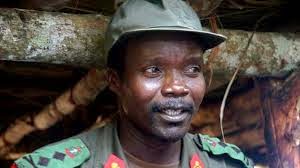 |
| Joseph Kony |
Haram Oga at the Top), be prosecuted at the ICC? Yes, he can because looking
at the above list by the ICC, I think the Boko Haram sect have done it all. They
have murdered civilians, destroyed schools and churches, taking hostages and
pillaging just to mention a few of their crimes. Not to exclude, their savage
attacks on military and police personnel.
ICC, remember former Liberian President, Charles Taylor, who was found guilty of 11 counts of war crimes, crimes
against humanity, and other serious violations of international law and
sentenced to 50 years in prison.
Office of the Prosecutor is currently conducting investigations on crimes
allegedly committed in eight states: Sudan (for the situation in Darfur), the
Democratic Republic of the Congo, Uganda, the Central African Republic, Kenya,
Libya, Côte d’Ivoire and Mali.
the Office of the Prosecutor is currently conducting preliminary analysis in
eight situations: Afghanistan, Colombia, the Republic of Korea, Georgia,
Guinea, Honduras, Nigeria and Palestine.
have ever participated in any activity that can be classified as a crime
against humanity, please include your full name and other contact details so we
can tell the police to come get you. Thanks
Onibokun

